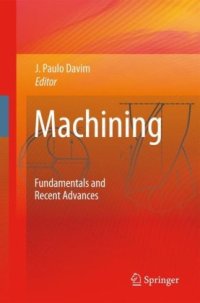
Ebook: Machining: fundamentals and recent advances
Author: João Paulo Davim (auth.)
- Genre: Technique
- Tags: Operating Procedures Materials Treatment, Manufacturing Machines Tools, Machinery and Machine Elements, Materials Science, Continuum Mechanics and Mechanics of Materials, Engineering Economics Organization Logistics Marketing
- Year: 2008
- Publisher: Springer-Verlag London
- City: New York ; London
- Edition: 1
- Language: English
- pdf
Machining is one of the most important manufacturing processes. Parts manufactured by others processes often require further operations before the product is ready for application. Machining is the broad term used to describe the removal of material from a work-piece. Machining processes can be applied to work metallic and non-metallic materials such as polymers, wood, ceramics and composites.
Machining: Fundamentals and Recent Advances is divided into two parts. The first part explains the fundamentals of machining, with special emphasis on three important aspects: mechanics of machining, tools, and work-piece integrity. The second part is dedicated to recent advances in machining, including: machining of hard materials, machining of metal matrix composites, drilling polymeric matrix composites, ecological machining (using the minimal quantity of lubrication), high-speed machining (sculptured surfaces), grinding technology and new grinding wheels, micro- and nano-machining, non-traditional machining processes, and intelligent machining (computational methods and optimization).
Professional engineers, researchers and advanced students interested or involved in modern manufacturing engineering will find Machining: Fundamentals and Recent Advances an invaluable reference.
Machining is one of the most important manufacturing processes. Parts manufactured by other processes often require further operations before the product is ready for application. “Machining: Fundamentals and Recent Advances” is divided into two parts. Part I explains the fundamentals of machining, with special emphasis on three important aspects: mechanics of machining, tools, and work-piece integrity. Part II is dedicated to recent advances in machining, including: machining of hard materials, machining of metal matrix composites, drilling polymeric matrix composites, ecological machining (minimal quantity of lubrication), high-speed machining (sculptured surfaces), grinding technology and new grinding wheels, micro- and nano-machining, non-traditional machining processes, and intelligent machining (computational methods and optimization). Advanced students, researchers and professionals interested or involved in modern manufacturing engineering will find the book a useful reference.